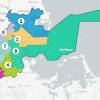Mayor Michelle Wu filed a proposal late Friday to replace Boston’s now-banned City Council redistricting map, along with a rare request for the City Council to take up the matter at its next Wednesday meeting.
The map and the request to expedite its approval come less than a week after a judge tossed out a different political boundary map approved by the mayor and the City council last year. The judge found that the council improperly used race as a predominating factor while redrawing the boundaries for the city's council districts.
The ruling has complicated timelines for the city’s forthcoming municipal elections, triggering a scramble to establish new boundaries in time for elections this fall.
Wu has deemed May 30 as the latest possible date for the city to ensure a timely and secure Sept. 12 preliminary election in the city. She has characterized her unilateral attempt to redraw the voting map as an effort to speed up the map-making process.
“As we wrote to this Honorable Body earlier in the week, time is of the essence,” Wu said in a letter to the council. The mayor has already filed a home rule petition seeking to extend candidate certification deadlines so that those seeking seats on the council can have adequate time to collect signatures to get on the ballot and ensure they live in the district where they intend to run.
Wu said that her new map “unifies neighborhoods within council districts and is one that I am prepared to sign. Whether this map or another amended by the Council, I urge your Honorable Body to take action on a redistricting map at the next Council meeting on Wednesday, May 17, in order for sufficient review and potential rejection or amendments before the May 30 deadline,” Wu’s letter said.
The unification of neighborhoods represents a particularly difficult task to achieve given that Boston has nearly two dozen distinct neighborhoods and only nine voting districts.
The mayor’s proposal contains several differences from the map that the court rejected, including restoring the four, predominately white, high-turnout precincts in southeastern most parts of Dorchester to District 3, represented by outgoing Councilor Frank Baker. Wu’s map also restores a pair of public housing developments to District 2, the South Boston district represented by Council President Ed Flynn.
Both areas were points of contention among opponents of the original redistricting plan.
Wu's proposal would also extend the northernmost portion of District 6 into Mission Hill. The area is currently represented by freshman Councilor Kendra Lara. District 4, the Dorchester-Mattapan district currently represented by freshman Councilor Brian Worrell, would extend westward into the areas along Forest Hills Street and Morton Street sides of Franklin Park.








